Items
Mediator is exactly
Mental Health
-
2020-04-04
Covid Helped Me Grow
My story takes place at the beginning of the pandemic in 2020 (Quarantine). The two weeks off that my high school mentioned had passed. It was at that point that I knew it was going to be a lot longer than two weeks. I was always quite the introvert, so the first week or so was very manageable for me. However, I soon realized how much I underappreciated getting the chance to leave the house and go do things such as going to restaurants, running errands, and most importantly, spending quality time with friends. It was during this time period that I was at one of the lowest mental states of my life. To add on to that, I was in a relationship at the time of quarantine. Long story short, we had some complications with our relationship before the pandemic, and it only got worse during the early days of it. However, for a more positive note, I spent a lot of time with my family and also my friends via facetime. Aside from that, I had an incredible amount of time to myself while stuck in quarantine. I used this time to myself to reflect on myself and how to improve my life and to get it together. As some time passed and after a lot of journaling, I had made some decisions that was going to change my life and make me a better and stronger individual. To list off a few, I had decided to end my relationship with this girl because I had found that we truly were not compatible with each other. Another thing was to get my first job so I can make money, stay productive, and also meet new people. I also decided that i was gonna be more social and really try my best to put myself out of my comfort zone moving forward, once the quarantine had concluded. I can proudly say that while I'm not perfect by any means, I had made these changes in my life and I am now extremely content with myself. Overall, this story is important to me because while I was in one of the worst periods of my life, this was one of, if not, the biggest learning period of my entire life. The amount of lessons that I took from my experience and the adversity that I went through during the pandemic has shaped me up to becoming the best version of myself. I can confidently say that I am just getting started and will continue to constantly improve myself as time will go on. -
2020-12-20
Declaring Patient 100 Deceased Life as a NYC EMT During an Unprecedented Global Pandemic
December 20th, 2020, started as an “ordinary” day for myself and my colleagues. 1600 hours rolled around, and my partner and I clocked in for our sixteen-hour tour. We had finally adjusted to our new routine of working a mandatory sixteen hours as opposed to twelve. As emergency medical technicians, we were at the forefront of the COVID-19 Pandemic in New York City. Our region was hit hard by COVID-19 and seemed to be the epicenter of the pandemic for longer than one could ever imagine. For NYC EMS workers before the pandemic, it was common to see around three thousand calls for service daily across all five boroughs. Once the pandemic struck the call volume rapidly overwhelmed the city's EMS resources as they answered a record seven thousand calls for service daily. My partner and I made small talk as we awaited the arrival of the outgoing crew. The day shift arrived back at the station exhausted, defeated, and depressed. They informed us that during their sixteen-hour tour, they had answered twenty calls for service; fifteen of which were for critically ill patients. After some small talk, we exchanged medication kits and radios as it was our turn to serve the great city. Immediately after logging on to the computer system and giving the dispatch center an in-service signal, we were called for a priority one assignment. Our unit was called to the scene of a thirty-two-year-old mother diagnosed with COVID-19 who had stopped breathing. As we arrived at the scene, I donned my four-day-old n95 mask, as well as a makeshift gown made from a garbage bag with holes cut for my head and arms. As we made our way up the five flights of stairs the sound of the screams grew louder. We entered the apartment to find a woman lying on the couch who was clinically deceased. For the next forty-five minutes, my partner and I worked feverishly to perform cardiopulmonary resuscitation, defibrillation, endotracheal intubation, as well as intravenous cardiac drug administration. Despite our efforts, the patient continued to show no signs of life, my partner and I locked eyes and nodded at one another, knowing we had done all that we possibly could have for this patient. I switched the cardiac monitor off and looked down at my watch as I said, “Time of death 1705 hours”. Our next responsibility was to inform the patient’s husband and children of her passing. While you train for many hours to show empathy after death, this task never gets easier. My partner sat in the kitchen with the family, while I prepared the paperwork for a death pronouncement. My partner delivered the life-shattering news and did her best to console a grieving family. After returning to our ambulance to decontaminate our equipment and restock for the next assignment I opened my logbook to record the death encounter. My heart sank as I turned to the next open page which was page number one hundred. In less than one year, I had pronounced one hundred patients deceased from COVID-related illnesses. In my short career before the pandemic, I had only pronounced about fifteen patients deceased. It was at that moment that the true magnitude of the pandemic sank in. COVID-19 had decimated the way of New York City life, the previously bustling city remained shuttered as many remained in indoors in hopes of preventing illness. Before the pandemic, I had known the city as a connection of vibrant neighborhoods filled with culture and joy. COVID-19 had robbed our great city of its life and color; for the next two years, the city appeared black and white as a shell of its previous greatness. These thoughts quickly fled my mind as my unit was once again called to another high-priority assignment. We were called to a sixteen-year-old man diagnosed with asthma, who had recently contracted COVID-19 and was struggling to breathe. Our days were filled with assignments like these, often with no rest, and zero opportunities for a meal break. Nearly one year into the COVID-19 pandemic, my colleagues and I were exhausted, and our mental health and morale were at an all-time low. Many of my collogues fell ill, and four of them died because of COVID-19. We had often asked ourselves and one another; “Why Us? Why are we still doing this job? and when will this end?” While these times were challenging, we understood that we had been called to work in EMS because of our passion for caring for those in need. Day in and day out, we found strength and resilience in one another. My colleagues and I had implemented daily peer support groups in which all were welcome to come and speak about their experiences. While COVID-19 seemed to pull the world apart, it pulled EMS staff closer together. Enemies quickly became friends, and seemingly overnight we all became family. Our perspectives were unique as we were the only healthcare providers to enter the homes of the ill, and feverishly worked to care for them under less-than-ideal conditions. As the number of COVID-19 cases began to decline with the introduction of the vaccine, my colleagues and I felt we could breathe a sigh of relief. As quickly as the pandemic entered our great city, it seemed to vanish even faster. Each shift brought hope as we watched businesses reopen, and the streets were once again filled with color and culture. While we experienced new variants and spikes in COVID-19 cases, we felt that our great city had become stronger and more resilient. While COVID has changed our way of life, one thing I will never forget is the comradery we built amongst the emergency medical services personnel. To this day my colleagues remain a second family in which I can confide after a difficult shift. While COVID was one of the greatest challenges faced by New York City, I feel that it has made us stronger and more resilient than ever. -
2020-08-18
life in camera
When COVID-19 first started I was in 8th grade. I didn't really understand what Covid really was or how serious it was. I went in feeling kind of okay about it all and staying at home. Once high school started things went downhill for me mentally. I did pretty well in school. I did all my work and turned it in on time and got good grades, but I struggled a lot mentally with myself and socializing with others. During that time being at home did help me to get closer to my mom, we would go walking throughout the day and that helped me a lot to start losing weight a lot more. However, I started to become depressed and struggled with my outward appearance a lot. Once we started going back to school in person, I didnt know ow how to act, I just felt ugly and quiet. I used to be such an outgoing person and I would talk to almost everyone. Now I don't like being in public and around others. I have very bad social anxiety and overthink a lot about what people think of me. I personally never got Covid-19 so I don't know how that can affect someone physically and I hope I never do. I watched those around me get it and the way that they struggled and even saw a few of them die. It was a really depressing time, to watch your loved ones around you hurt and struggle and eventually give up, and you're never able to see them again. Going back to school in person did help me a lot. Socializing with people and seeing my friends that I hadn't seen in so long was what really helped me to get out of my shell and help me love myself more. -
2020-04-11
A story under the pandemic
The sudden outbreak of the epidemic in 2019 caused me to experience many more firsts in my life: my first online class, the first time I needed to wear a mask when I went out, the first time I had to take my temperature to be sterilized when I went to the doctor, and the first time I graduated high school in quarantine. In just a few short months, the outbreak spread across multiple countries turning into a global resistance, with new cases and even deaths increasing every day. Schools were closed and students were told to stay home. When I saw these real and ever-growing numbers, it was not easy to feel good. But after all, I was just watching the data on my cell phone refreshing, in fact, I have not really felt the seriousness of this virus. Until I saw a video: a girl's father because infected with the virus, due to the development of too fast, the father in just a few days time passed away, the girl looked at her father's funeral car drove away, which really found that the father is really gone, never come back, the girl through the mask towards the police on duty at the roadside disappointed and helpless shouted out a sentence: I have no father! That was the first time I felt the horror of this virus. In addition to my automatic daily tracking of the latest progress of the case, social media was flooded with all sorts of bad news about the outbreak, including how it was spreading, the misery and agonizing struggles of the infected and their families, and so on. I was so worried about myself or my family members and friends being infected that I was constantly urging the elderly members of my family not to go out, so as not to be infected. At the same time, the frantic buying of masks, goggles, sterilizing alcohol, and so on, by many people was increasing the fear of the disease. As a result of the epidemic, I know that many people are suffering from mental health problems such as insomnia or anxiety. I am one of them. -
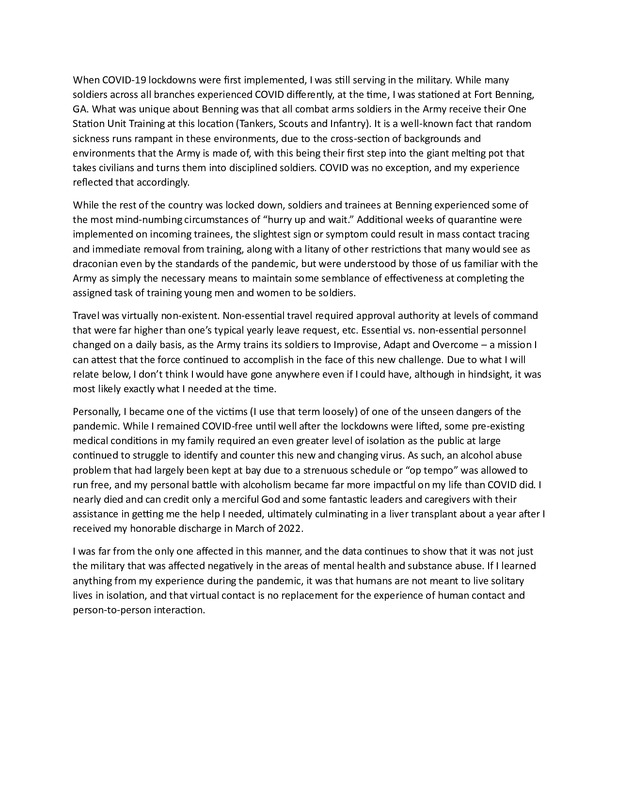 2020-03-31
2020-03-31Locked down, Locked in
I was a SSG in the US Army when the lockdown hit. The isolation let my personal demons almost get the best of me, but lessons were certainly learned and I pray we never get to that point ever again. -
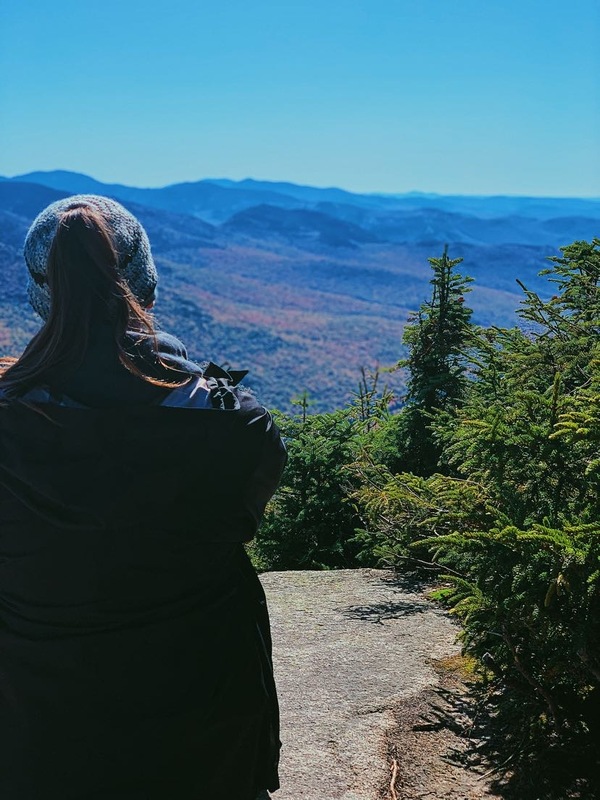 2020-05-08
2020-05-08Scaling Mountains - Overcoming Obstacles (and New Englands peaks) During the Covid-19 Pandemic
During the pandemic, I was lucky that I didn't lose anyone close to me. I know many people around me and in the world who watched their loved ones die from COVID-19. It has also had long-lasting health effects on many people as well. It is an ongoing conversation because people are still contracting the virus daily. Lockdown was a surreal moment for many in our ordinarily fast-paced world. The entire world stopped, and for once, we couldn't rely on our usual entertainment and schedules for distraction. This led to the development of new habits, which, unfortunately for me, were not just board games and binge-watching Netflix. Alcoholism had been at my doorstep since my senior year of high school, with my dependence on the substance worsening as the years passed. This is a genetic condition, and I have had countless family members struggle and die because of substance abuse, mainly alcohol. When the pandemic hit, I drank nearly every day, and this continued during lockdown with my roommate and a few friends. Not only was this dangerous because of the spreading pandemic, but it also worsened my mental health. Soon, my college shut down, and I had to move back home, where my substance abuse continued. My relationship had fallen apart when my ex moved back to India as he was on a student visa. The drinking and emotional isolation/strife led to a breakdown wherein intrusive suicidal thoughts plagued me. Something had to change; one night, I quit all substances and contacted my PCP about a mental health evaluation. I know my diagnosis was wrong, but it got me on the medication I needed to forget the intrusive thoughts and piece my life back together. My saving grace was my father and, eventually, my friends, who decided to pick me up and give me a distraction. This distraction became hiking mountains, a shared hobby of previous substance abusers. The chemicals released in the brain during these hikes and the physical exercise filled the void alcohol used to. It served it and began to heal the void left by years of mental health struggles and abuse. Like in this picture, the world's problems and my own seemed small when I was on top of a mountain. Not only that but also hiking is a very social-distance-friendly activity. The love for hiking fostered in my childhood was rekindled during the pandemic and remains one of my favorite things to do. My father and I are attempting to walk up all New England's notable peaks. -
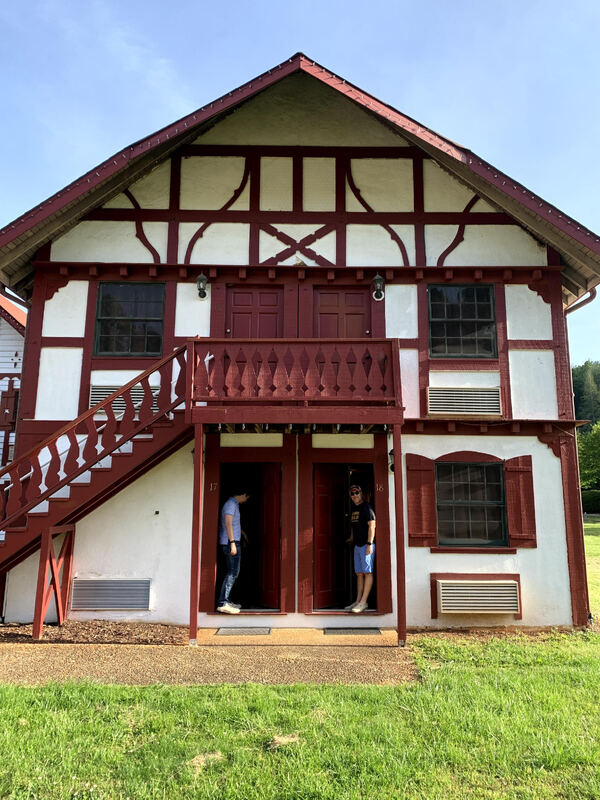 2020-08-01
2020-08-01The Pleasant Sounds of a Quiet Town
The photograph captures a moment of my family in Helen, Georgia. It marked our very first vacation as the pandemic began to subside, and society slowly started to reopen. Throughout the challenging year of 2020, I wrestled with numerous dark and trying circumstances. My engagement dissolved, my health deteriorated, and my battle with depression intensified. I often felt isolated, with nowhere to turn for human connection, as everything around us remained shuttered. The deserted streets and vacant stores seemed to echo the emptiness I felt inside. However, this trip to Helen breathed new life into me. For the first time in a year, I felt a spark of vitality. In Helen, I could once again frequent bustling restaurants, immerse myself in the sound of live music, and explore the welcoming shops. It marked the beginning of a remarkable turnaround in my life, which has since led to some of the most fulfilling years I've experienced. Today, I cherish even the smallest moments, such as a simple trip to buy groceries and the comforting presence of people in my life. -
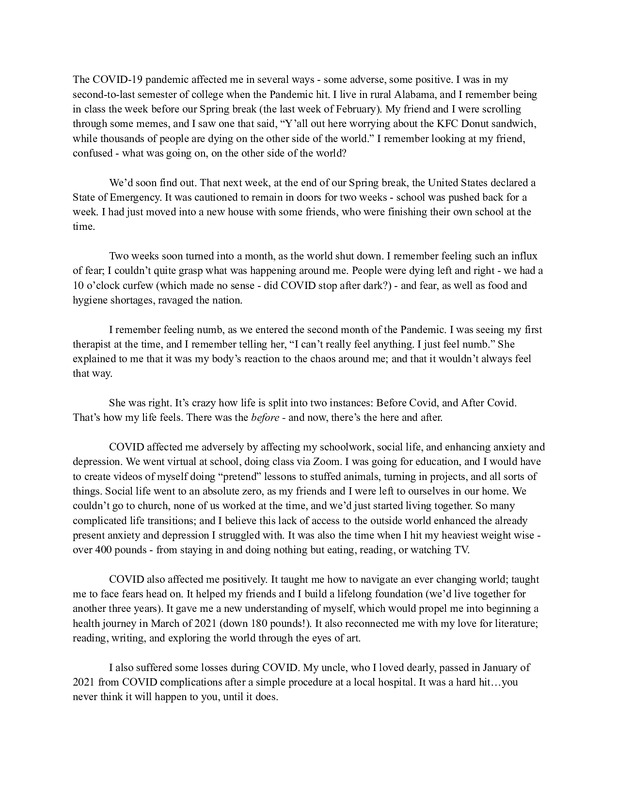 2023-07-19
2023-07-19COVID-19 Archive Story_H. Crowder
I have uploaded a personal story of how COVID-19 impacted my life; and how, in my mind, there is a before and after, two different sections of my life. I also observe the changes that were influenced by the Pandemic. -
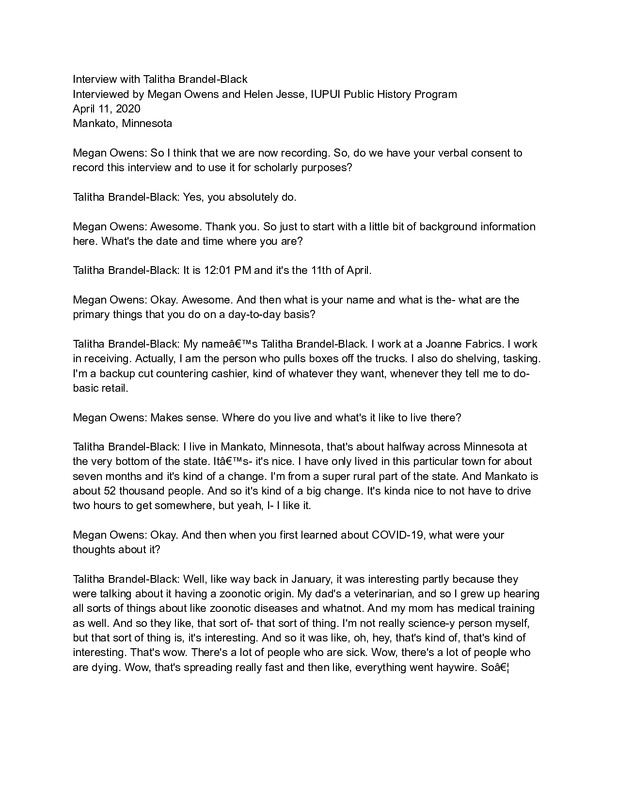 04/11/2020
04/11/2020Talitha Brandel-Black Oral History, 2020/04/11
-
2020-12-10
My pandemic mental condition
During pandemic, I was in the online English Bridge program of my university. The amount of assignments were a lot, and all I did during the pandemic was just waking up at 5am, eating break fast, going to class on zoom, eating lunch, doing assignments, eating dinner, and sleep. I could not even going grocery store to buy food or snacks because I could not finish assignments unless I just kept studying. Thus, in my room, I was alone and studying without any joy. My family supported me a lot for my study but I felt that only I was doing what I wanted (study), whereas my family was just working and doing domestic affairs. I was so depressed because if I was not existed, I did not let my family work so hard. I wanted to disappear at the time. -
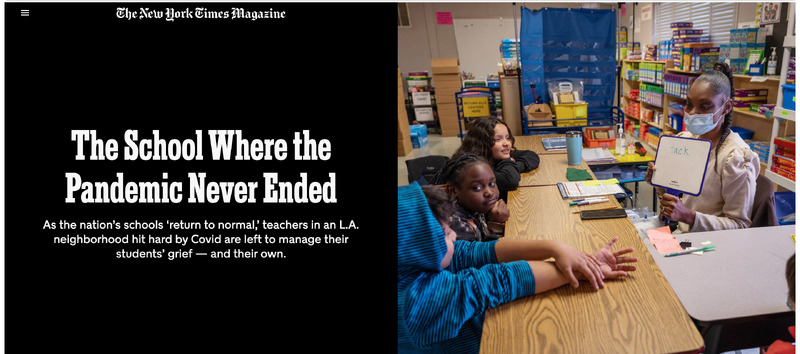 2023-05-15
2023-05-15Analysis of "The School Where the Pandemic Never Ended"
Analyzing a New York Times article entitled, "The School Where the Pandemic Never Ended" through the lens of Daniel Defoe and Thomas Paine -
2020-08-22
Finding peace during the pandemic
During the pandemic, like most people, I experienced high amounts of stress and feeling kind of hopeless. I would spend the majority of my day playing video games in my house which doesn't really seem like a bad thing to be doing, but over time I could feel myself being lost and not the same person anymore. This was because before the pandemic, I was constantly on the move and interacting with people, so when this was taken from me I was unable to resume the things that I had always done. I began school at a local university and found myself unable to make friends as I had easily done in the past, because my social skills had taken a huge fall due to the pandemic. I found myself being a really quiet person and would only talk when I was talked to, and also found that I did not have the drive to complete tasks that should have been easy to complete. The way I began to overcome this was when I joined a local dance group. They were practicing at a park following social distance regulations. I did not instantly feel comfortable because I was unsure of myself and was not very confident when I first joined. However, the group was very welcoming and friendly towards me and they gave me all of the time and space I needed at the time to begin coming out of the shell that the pandemic had formed around me. Within about a year, these members have become some of my closest friends and we hang out daily. My confidence has reached an all time high that honestly I think might have caused me to become bored whenever I know something is a waste of time but is something that I have to do. This isn't necessarily a bad thing because it is definitely an improvement from before where I would not attempt to do things because I did not feel the confidence to complete them. Had I not joined the group, I would've stayed in my shell and would not have made the friends I have today. They gave me a chance to become active again and become socially active as well. -
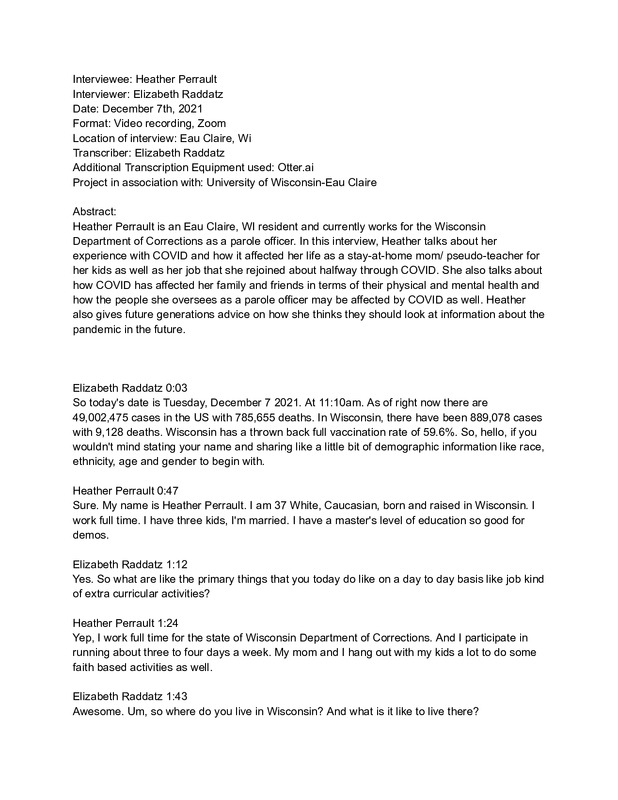 12/07/2021
12/07/2021Heather Perrault Oral History, 2021/12/07
Heather Perrault is an Eau Claire, WI resident and currently works for the Wisconsin Department of Corrections as a parole officer. In this interview, Heather talks about her experience with COVID and how it affected her life as a stay-at-home mom/ pseudo-teacher for her kids as well as her job that she rejoined about halfway through COVID. She also talks about how COVID has affected her family and friends in terms of their physical and mental health and how the people she oversees as a parole officer may be affected by COVID as well. Heather also gives future generations advice on how she thinks they should look at information about the pandemic in the future. -
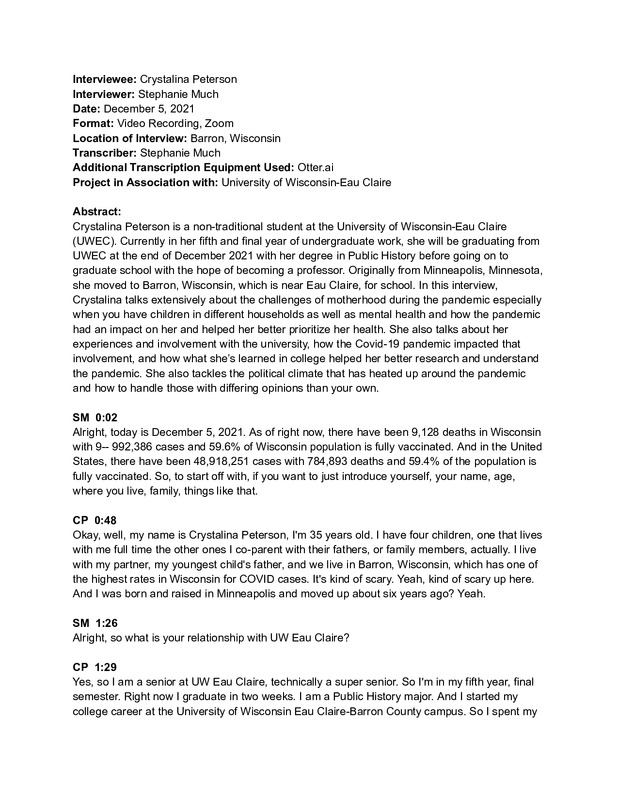 12/05/2021
12/05/2021Crystalina Peterson Oral History, 2021/12/05
Crystalina Peterson is a non-traditional University of Wisconsin-Eau Claire (UWEC) student. Currently, in her fifth and final year of undergraduate work, she will graduate from UWEC at the end of December 2021 with her degree in Public History before going on to graduate school with the hope of becoming a professor. Originally from Minneapolis, Minnesota, she moved to Barron, Wisconsin, near Eau Claire, for school. In this interview, Crystalina talks extensively about the challenges of motherhood during the pandemic especially when you have children in different households as well as mental health and how the pandemic had an impact on her and helped her better prioritize her health. She also talks about her experiences and involvement with the university, how the Covid-19 pandemic impacted that involvement, and how what she’s learned in college helped her better research and understand the pandemic. She also tackles the political climate that has heated up around the pandemic and how to handle those with differing opinions than your own. -
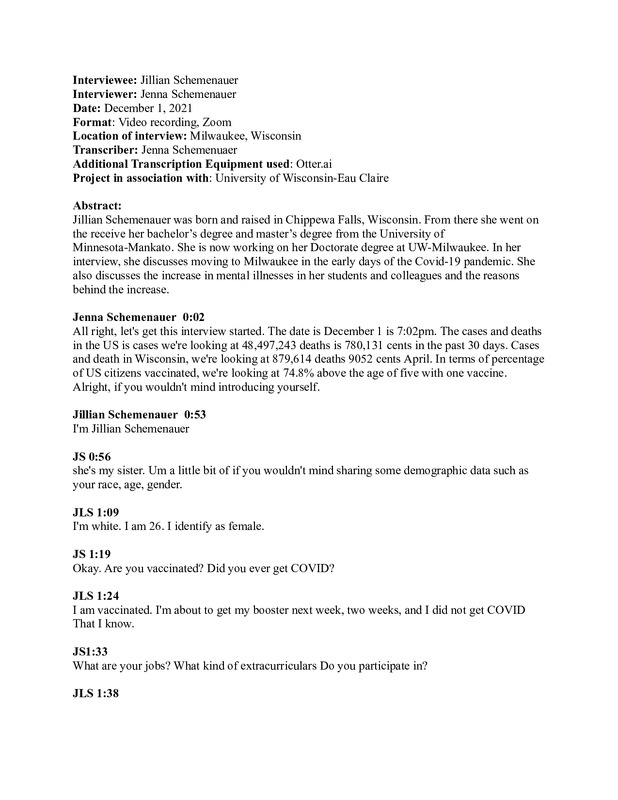 12/01/2021
12/01/2021Jillian Schemenauer Oral History, 2021/12/01
Jillian Schemenauer was born and raised in Chippewa Falls, Wisconsin. From there she went on the receive her bachelor’s degree and master’s degree from the University of Minnesota-Mankato. She is now working on her Doctorate degree at UW-Milwaukee. In her interview, she discusses moving to Milwaukee in the early days of the Covid-19 pandemic. She also discusses the increase in mental illnesses in her students and colleagues and the reasons behind the increase. -
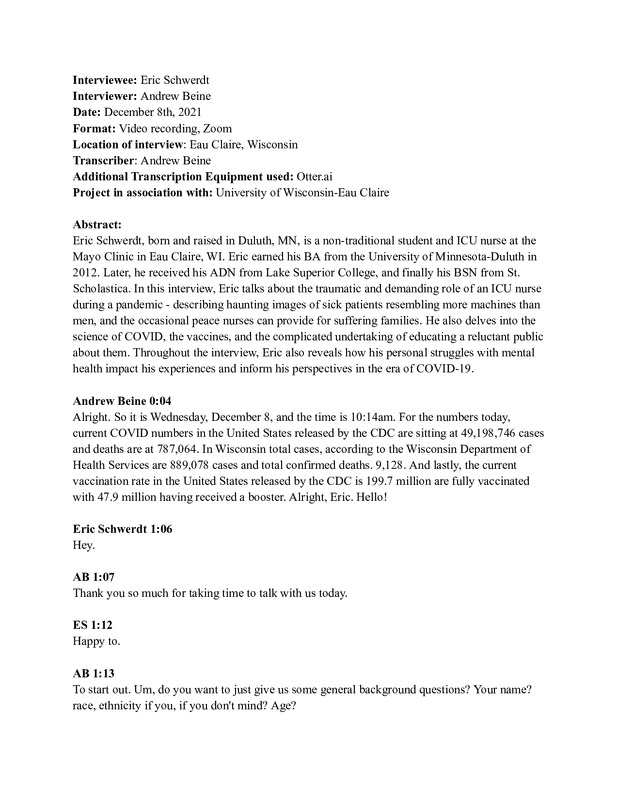 12/08/2021
12/08/2021Eric Schwerdt Oral History, 2021/12/08
Eric Schwerdt, born and raised in Duluth, MN, is a non-traditional student and ICU nurse at the Mayo Clinic in Eau Claire, WI. Eric earned his BA from the University of Minnesota-Duluth in 2012. Later, he received his ADN from Lake Superior College, and finally his BSN from St. Scholastica. In this interview, Eric talks about the traumatic and demanding role of an ICU nurse during a pandemic - describing haunting images of sick patients resembling more machines than men, and the occasional peace nurses can provide for suffering families. He also delves into the science of COVID, the vaccines, and the complicated undertaking of educating a reluctant public about them. Throughout the interview, Eric also reveals how his personal struggles with mental health impact his experiences and inform his perspectives in the era of COVID-19. -
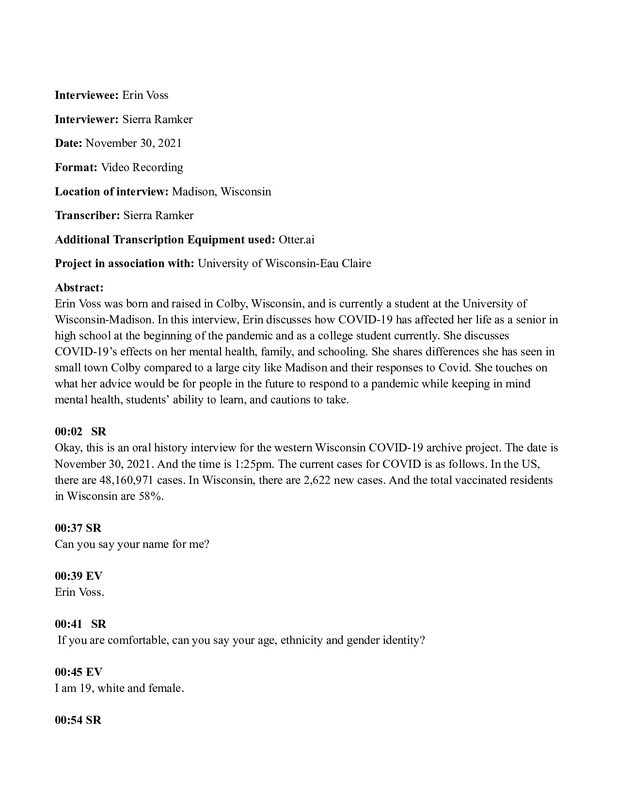 11/30/2021
11/30/2021Erin Voss Oral History, 2021/11/30
Erin Voss was born and raised in Colby, Wisconsin, and is currently a student at the University of Wisconsin-Madison. In this interview, Erin discusses how COVID-19 has affected her life as a senior in high school at the beginning of the pandemic and as a college student currently. She discusses COVID-19’s effects on her mental health, family, and schooling. She shares differences she has seen in small town Colby compared to a large city like Madison and their responses to Covid. She touches on what her advice would be for people in the future to respond to a pandemic while keeping in mind mental health, students’ ability to learn, and cautions to take. -
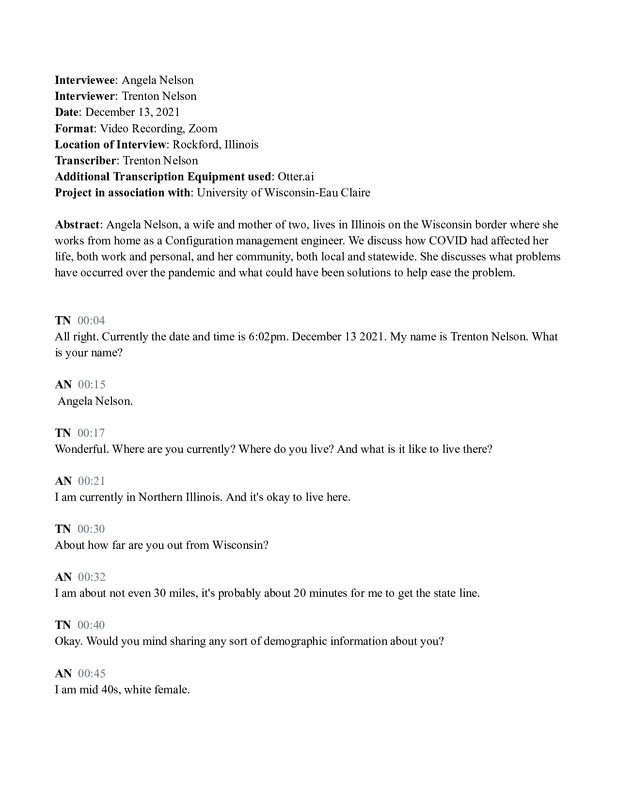 12/13/2021
12/13/2021Angela Nelson Oral History, 2021/12/13
Angela Nelson, a wife and mother of two, lives in Illinois on the Wisconsin border where she works from home as a Configuration management engineer. We discuss how COVID had affected her life, both work and personal, and her community, both local and statewide. She discusses what problems have occurred over the pandemic and what could have been solutions to help ease the problem. -
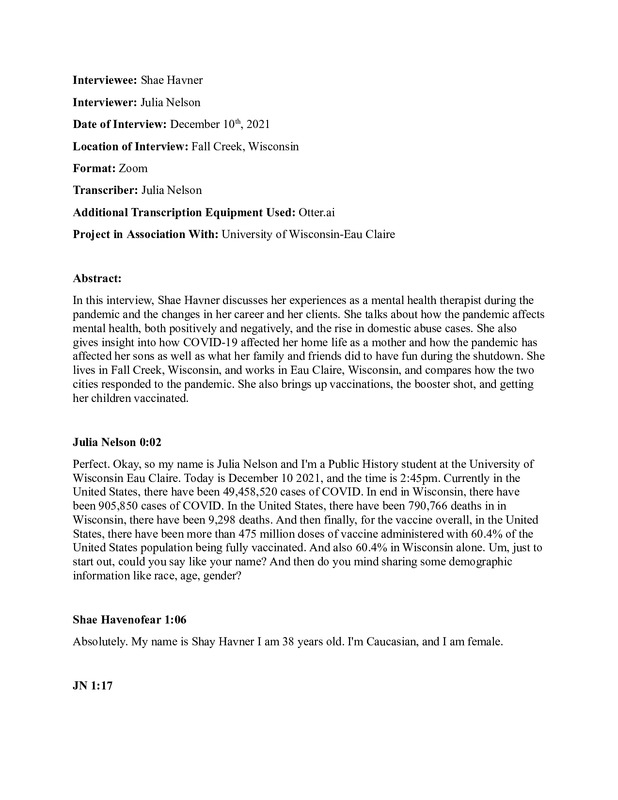 12/10/2021
12/10/2021Shae Havner Oral History, 2021/12/10
In this interview, Shae Havner discusses her experiences as a mental health therapist during the pandemic and the changes in her career and her clients. She talks about how the pandemic affects mental health, both positively and negatively, and the rise in domestic abuse cases. She also gives insight into how COVID-19 affected her home life as a mother and how the pandemic has affected her sons as well as what her family and friends did to have fun during the shutdown. She lives in Fall Creek, Wisconsin, and works in Eau Claire, Wisconsin, and compares how the two cities responded to the pandemic. She also brings up vaccinations, the booster shot, and getting her children vaccinated. -
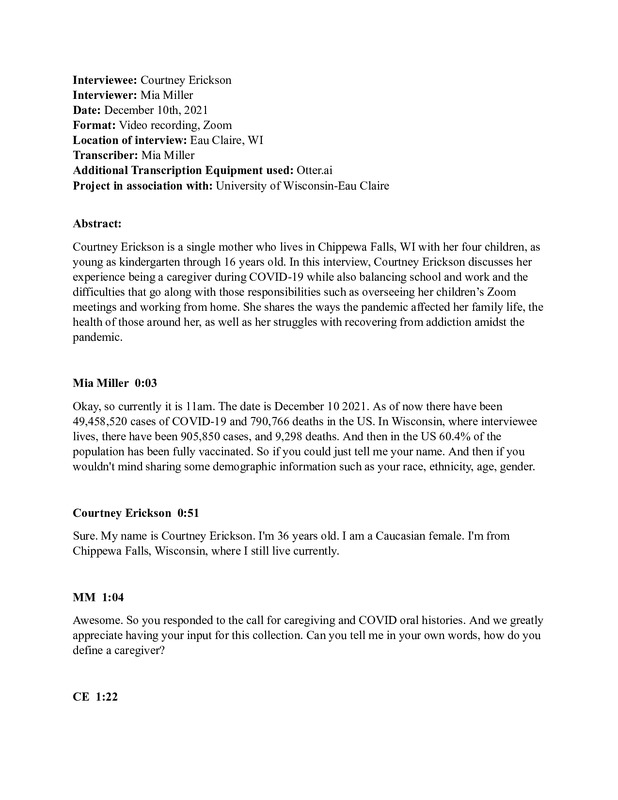 12/10/2021
12/10/2021Courtney Erickson Oral History, 2021/12/10
Courtney Erickson is a single mother who lives in Chippewa Falls, WI with her four children, as young as kindergarten through 16 years old. In this interview, Courtney Erickson discusses her experience being a caregiver during COVID-19 while also balancing school and work and the difficulties that go along with those responsibilities such as overseeing her children’s Zoom meetings and working from home. She shares the ways the pandemic affected her family life, the health of those around her, as well as her struggles with recovering from addiction amidst the pandemic. -
 2023-03-20
2023-03-20Disorientation: The Feeling I had on March 11th, 2020
What Happened on March 11th, 2020 -
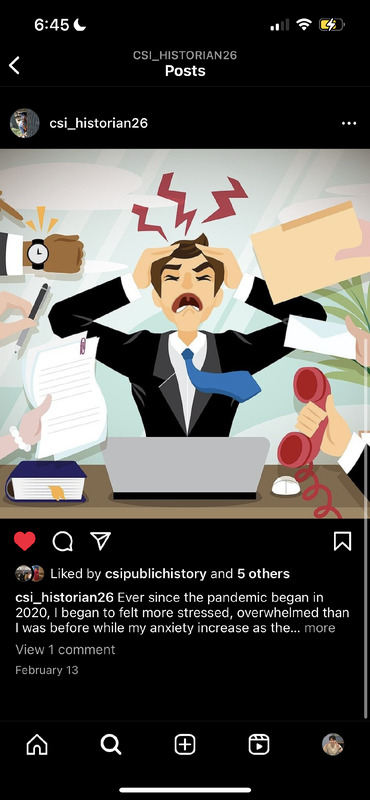 February 13th, 2023
February 13th, 2023Status of Mental Health During Lockdown
I was overwhelmed and stress when we went to online classes. The photo I posted is a representation of how I felt during that time -
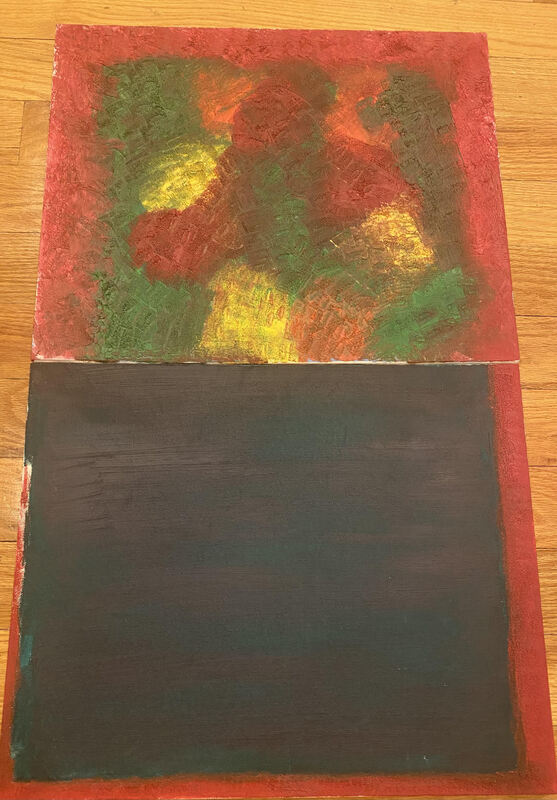 2022-03
2022-03Yesteryear
Yesteryear is the product of pent up anxiety, confusion, loss, depression and hopelessness, painted in 2022. It is how I would describe life before and after Covid-19. Separated into two pieces the anterior canvas is multicolored, to represent the carefree state of life. It can represents the high points in my life pre-pandemic, inclusive of freedom and family. The oil protrudes in some parts and is flat in others signifying the highs and lows of everyday life. The posterior canvas is quite the opposite if viewed closely, some of the colors used in the painting above have been covered in dark colors. It is smooth to the touch. No high points in this instance. All lows. Dreary. Dark. The red bordering both , represents the vitality of human nature. At the top it was uncontrolled, bleeding into all other aspects of life pre-Covid. As it travels south, it becomes thinner, more rigid, more linear. It then starts to completely disappear and despair has taken its place. -
 2020-03-24
2020-03-24Mental Breakdown
My sister, Heidi, passed away in Washington, DC, on March 23, 2020. I wasn’t allowed to be with her when she died. My sister was my best friend. I was so lost. Her children, Significant other, my mother, her best friend, and I couldn’t have a funeral for her because of the rules put into place for Covid. So, we could not have a memorial for her till and year and four months later. At the same time, everything began to shut down. My husband works for the NYPD; I was terrified of him getting sick and losing him. Every day after he left for work, I would fall on the floor and break down in tears. I live next to a nursing home facility on Beach 119th St. in Rockaway Park. At this time, I would stare out my windows to look at the ocean to try to calm myself. For weeks, I would see out the right side of my windows and the ambulances and medical examiner vans showing up non-stop to the nursing home for ten days. Bodies were being taken out morning, noon, and night. The flashing red lights signaled that my mental health was in danger. I felt myself crashing many times. I was devasted. To this day, I carry so much internal trauma, I don’t know if I’ll ever recover. I hate this world and the cruel people in it. People have become so ugly because of Covid. I doubt I’ll ever be able to escape the mental anguish that lives in my soul... -
2021-10-05
The Road Rager
It was late October 2021. The quiet and muted reactions to my provocative liberal bumper stickers on my Toyota Prius became louder and louder as the pandemic restrictions concluded. I was drinking my kale smoothie when I heard loud shoutings while waiting for the light to turn green. I immediately felt fear as I thought a violent incident was happening outside. I looked to my right and left and noticed an angry truck driver. As I pulled my window down, I thought about how much life had changed during these last two years. Folks crippled with COVID anxiety and forced inside had returned to the jungle that is car traffic. The result? Anger at the other side. Anger at those they deemed responsible for their restricted life. Anger at those who they believed were trying to muzzle and isolate society. The noises subsided, and I noticed I had just thrown my medium Burger King Drink at the car. Was I the angry road rager? Yes. -
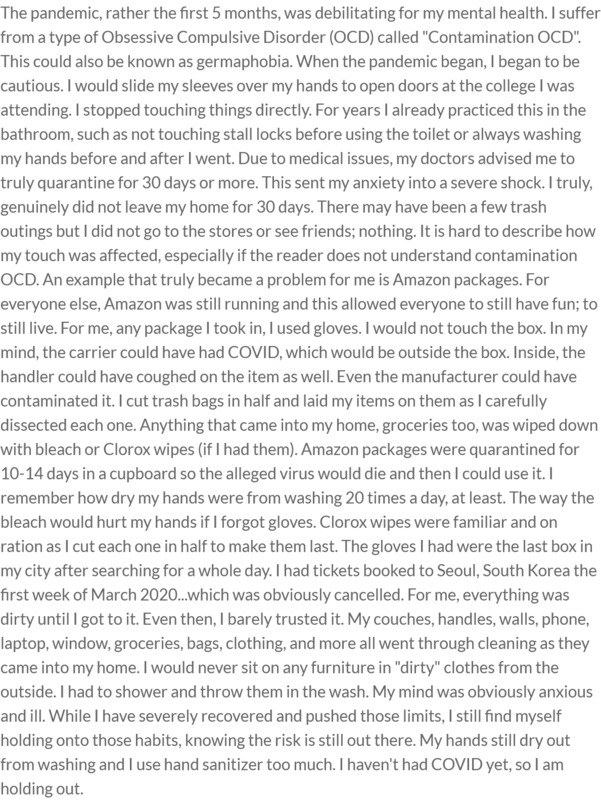 2020-03-05
2020-03-05Germs and Touch: Contact OCD during the pandemic
The pandemic, rather the first 5 months, was debilitating for my mental health. I suffer from a type of Obsessive Compulsive Disorder (OCD) called "Contamination OCD". This could also be known as germaphobia. When the pandemic began, I began to be cautious. I would slide my sleeves over my hands to open doors at the college I was attending. I stopped touching things directly. For years I already practiced this in the bathroom, such as not touching stall locks before using the toilet or always washing my hands before and after I went. Due to medical issues, my doctors advised me to truly quarantine for 30 days or more. This sent my anxiety into a severe shock. I truly, genuinely did not leave my home for 30 days. There may have been a few trash outings but I did not go to the stores or see friends; nothing. It is hard to describe how my touch was affected, especially if the reader does not understand contamination OCD. An example that truly became a problem for me is Amazon packages. For everyone else, Amazon was still running and this allowed everyone to still have fun; to still live. For me, any package I took in, I used gloves. I would not touch the box. In my mind, the carrier could have had COVID, which would be outside the box. Inside, the handler could have coughed on the item as well. Even the manufacturer could have contaminated it. I cut trash bags in half and laid my items on them as I carefully dissected each one. Anything that came into my home, groceries too, was wiped down with bleach or Clorox wipes (if I had them). Amazon packages were quarantined for 10-14 days in a cupboard so the alleged virus would die and then I could use it. I remember how dry my hands were from washing 20 times a day, at least. The way the bleach would hurt my hands if I forgot gloves. Clorox wipes were familiar and on ration as I cut each one in half to make them last. The gloves I had were the last box in my city after searching for a whole day. I had tickets booked to Seoul, South Korea the first week of March 2020...which was obviously cancelled. For me, everything was dirty until I got to it. Even then, I barely trusted it. My couches, handles, walls, phone, laptop, window, groceries, bags, clothing, and more all went through cleaning as they came into my home. I would never sit on any furniture in "dirty" clothes from the outside. I had to shower and throw them in the wash. My mind was obviously anxious and ill. While I have severely recovered and pushed those limits, I still find myself holding onto those habits, knowing the risk is still out there. My hands still dry out from washing and I use hand sanitizer too much. I haven't had COVID yet, so I am holding out. -
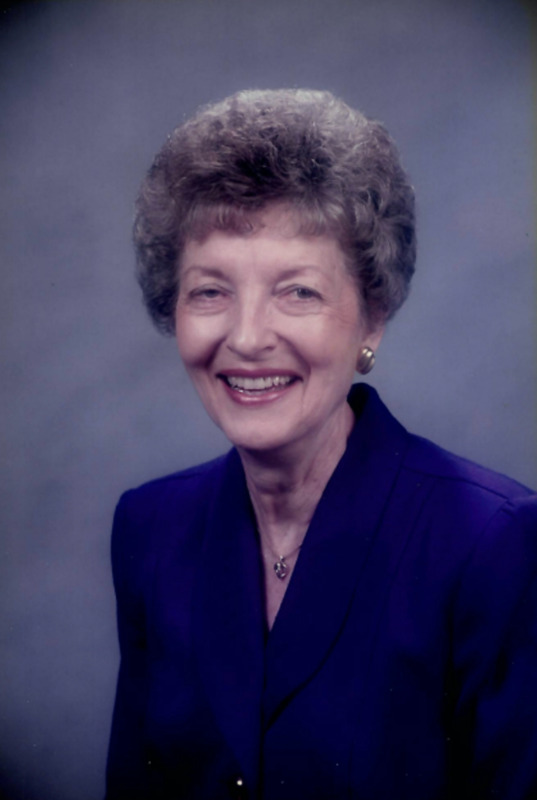 2022-07-02
2022-07-02Taking Care of My Grandma During COVID
This is a story of taking care of my grandma during COVID. A lot of the time I was employed as a caretaker for my grandma overlapped with the height of COVID. -
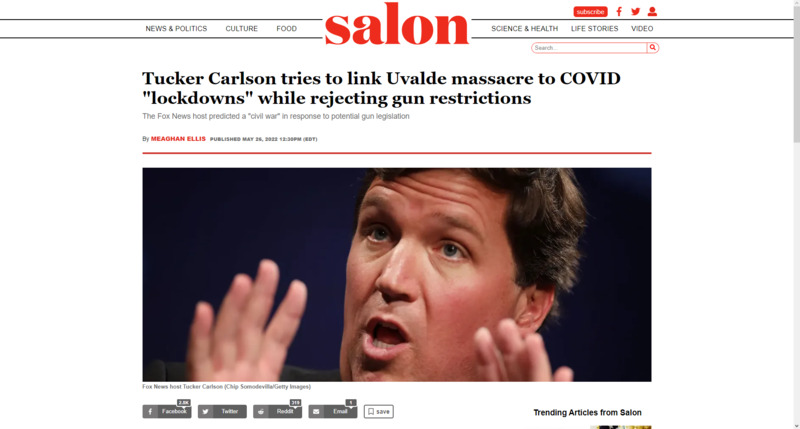 2022-05-26
2022-05-26Tucker Carlson tries to link Uvalde massacre to COVID "lockdowns" while rejecting gun restrictions
This is a news story from Salon by Meaghan Ellis. This is an opinion piece on what this author thinks about Fox News contributor Tucker Carlson and his approach to the shooting in Texas. The news story says that Carlson claims the lockdowns increased mental illness cases. Whether this is true remains to be seen, but from my own experience with lockdowns, I did have trouble adjusting. I had at least a few mental breakdowns over feeling like a prisoner in my own home. I don't think the lockdowns would trigger everyone into becoming a potential mass shooter, but I do not think they were healthy for many people either. People need human contact regularly, and being cut off from that and only having social media or very few people to see in-person would feel isolating. I think mental health is not paid attention to enough by public health officials when it comes to lockdowns. Mental health is still part of overall health. I do understand why the lockdowns happened, but I think many went on too long, which has had a bad effect on society. It is obviously not the only reason someone would have a mental illness, but for people that already did have mental issues, it made them worse. I have high functioning autism and without a good support system, I'd possibly be doing way worse. -
2020-05-01
Background Noise
From 2005 to 2020, I was a police officer. My life was hectic and noisy. I carried two mandatory work cell phones everywhere I went, 24 hours a day, which rang, beeped, and chirped continuously. A police radio was on in my house, in my car, or in my ear, every hour of the day. In my world, people were always talking, at work and at home. I resigned from my position in April of 2020, just as the COVID lockdowns were coming into effect. I suddenly found myself with nowhere to be due to no longer having a job and having minimal to no contact with others due to the lockdown. Being an avid flyfisher, my days became about spending most of my time on the river alone. This was also not normal, as I am also a flyfishing guide, and am used to fishing with other people, who are usually talking to me, but due to COVID, I no longer had clients. The constant of my life went from hearing people talking (and yelling) and devises making noise, to the sound of the rushing water of the river. I soon found improvements appearing in my life. I began feeling better, sleeping better, eating better, was able to focus more, and had a much more positive attitude. All of which were side effects of being on the river everyday by myself. The COVID pandemic was an opportunity for people to re-connect with nature unknowingly, as outdoor activities were their only choice of recreation outside of their homes. Due to outdoor activity being the only option for recreation, people learned, or remembered in some cases, the value which nature can add to life, as well as how simple it is to take nature for granted. The pandemic forced people back into nature, which re-awakened (or maybe awakened for the first time) the special relationship between the human senses and nature. -
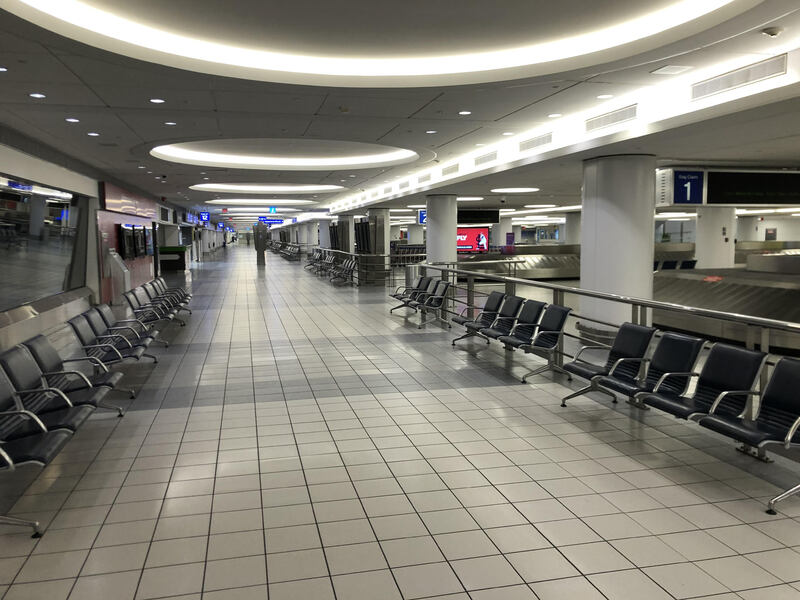 2020-05-23T09
2020-05-23T09Sampling a dystopian world
We lived in a very town in western Illinois as the pandemic arrived in America. Covid-19 seemed abstract until circumstances caused us to travel to a major international airport. The eerie quiet, in place of what should have been a noisy, madcap atmosphere, elevated sounds I normally would not have heard. It was as if a scene from a science fiction film had jumped off the screen and into my life. The experience had a nightmarish quality that has stayed with me two years later. -
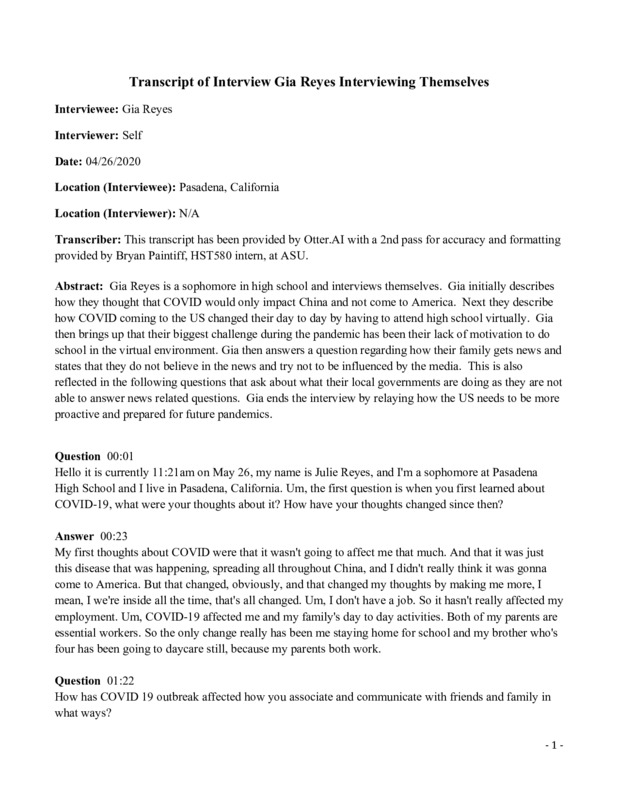 2020-05-26
2020-05-26Reyes_Gia_
C19OH -
 2022
2022Teacher Burnout is Real
826 National is a non-profit organization focused on helping students with their writing skills. In this post, they highlight statistics related to teacher burnout and stress during the second year of the pandemic. One of the most alarming statistics is that 90% of teachers that participated say that teacher burnout is a serious issue. The pandemic has exacerbated the stress put on educators and they have received little support in return. -
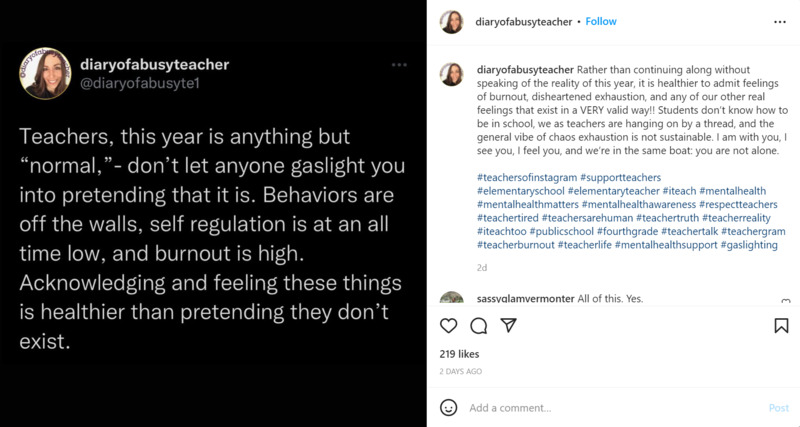 2022
2022Not a Normal Year for Teachers
This post shows an example of teachers supporting each other through the end of the 2022 school year. In many different places, people are acting as if life is "normal" again. Schools are not requiring masks or sanitation procedures, school is in session like normal, in-person assemblies, activities, and sports are occurring. However, teachers can definitely tell that everything is not normal, and our job continues to be increasingly more difficult. -
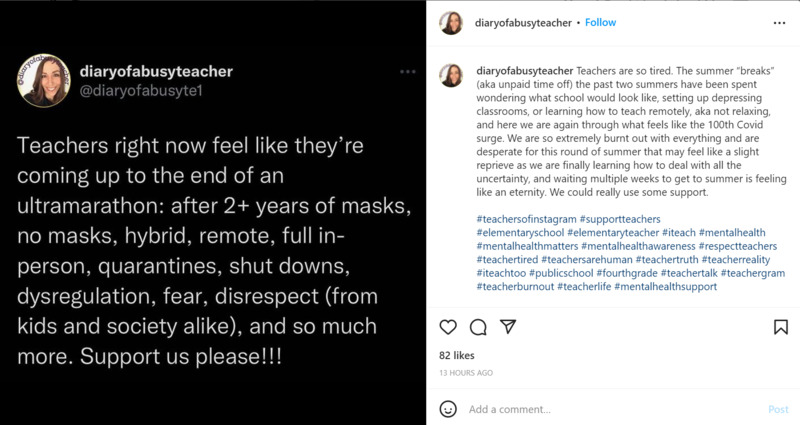 2022
2022Teachers are Tired
Now that we are ending the 2022 school year, many people have "returned to normal". Most students no longer wear masks in schools. However, we are still working through the pandemic. Teachers are still at risk for contracting COVID and are navigating the severe behavioral problems of students. With summer approaching, everyone is looking forward to a break from an extremely stressful year. -
 2022-01-10
2022-01-10Criticizing Teachers
Even before the pandemic, many teachers have felt that they are underappreciated. During the pandemic, the number of responsibilities on teachers increased. They have been forced to teach during a health crisis, putting themselves at risk. When teachers are sick, the remaining teachers are forced to pick up the work without any empathy if they are not able to fulfill all obligations. The expectations have increased as teachers are also battling increasing behavior issues. -
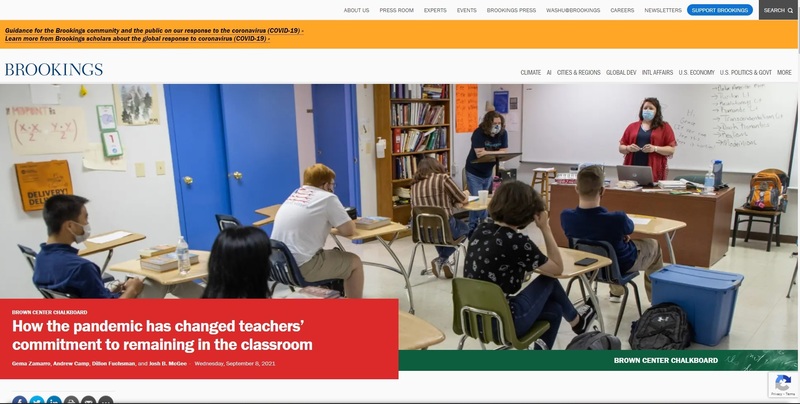 2021-09-08
2021-09-08How the Pandemic Has Changed Teachers' Commitment to Staying in the Classroom
According to the article, there was a 16% national turnover rate for teachers before the pandemic. A survey given in January 2021 shows that almost 25% of teachers stated that they wanted to leave teaching. Pre-pandemic surveys and surveys given during the pandemic also show that less teachers believe that they will stay in education until retirement. The pandemic has required that teachers maintain the same responsibilities, while also piling on constant communication with parents (even without a response), social-emotional lessons, plans for asynchronous and synchronous learning, teaching students virtually and in-person at the same time, keeping up with changing health and safety regulations, and having to deal with increasing behavior issues. -
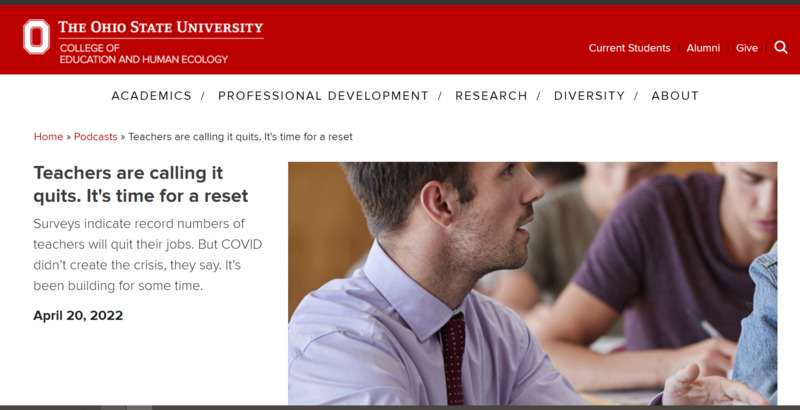 2022-04-22
2022-04-22Teachers Are Calling It Quits
Before the pandemic, teachers already experienced a job where they are overworked, often underpaid, and underappreciated. This article details rising frustrations by teachers during the pandemic and the subsequent leaving of many people from education. -
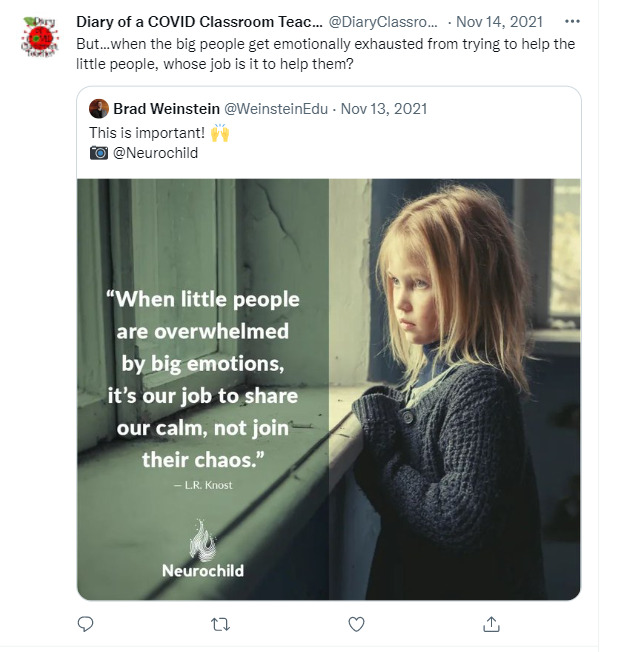 2021-11-14
2021-11-14Emotionally Exhausted Teacher
This item is a screenshot from a Twitter account known as the Diary of a COVID Classroom Teacher. This account's response to a picture about children with big emotions shows the frustrations that many teachers are facing during the pandemic. Many students have struggled due to the lack of routine and disruptions in their lives caused by COVID-19. Throughout the nations, behavior issues are being seen. Teachers are struggling more than ever while they try to help these students who are acting out while also staying on top of their other responsibilities. -
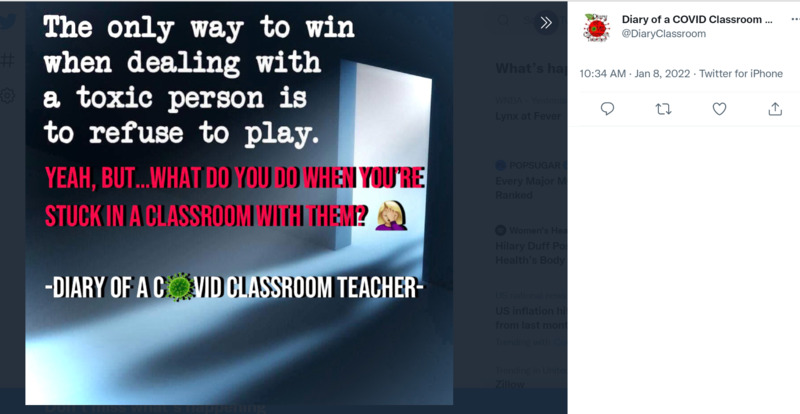 2022-01-08
2022-01-08Frustrations of a Teacher
The item is a screenshot from a Twitter post of someone known as "Diary of a COVID Classroom Teacher". For their post, they had edited a motivational photo to question how to handle a toxic person if they are in your classroom. This post expresses frustrations that are shared by many teachers during the pandemic. With many schools being entirely in-person for the first time in two years, teachers are experiencing a huge amount of behavior issues, most likely caused by lack of routine and social/emotional growth during this time. -
2020-07-14
Love in Covid 19
My roommate and I agreed because we felt that owning a puppy would help us cope with being confined at home, but then my buddy stated she would not return and hoped that we would adopt it immediately. After a year, my roommate unexpectedly informed me that he wanted to get a large dog. My roommate, by the way, is more scared of dogs than I am, but after a year of getting along, he has progressively become less afraid of dogs. So we went to the Pima Animal Center's kennel in search of a suitable dog, eventually settling on a Belgian Shepherd. Having these two dogs has brought both delight and stress to me and my housemates. -
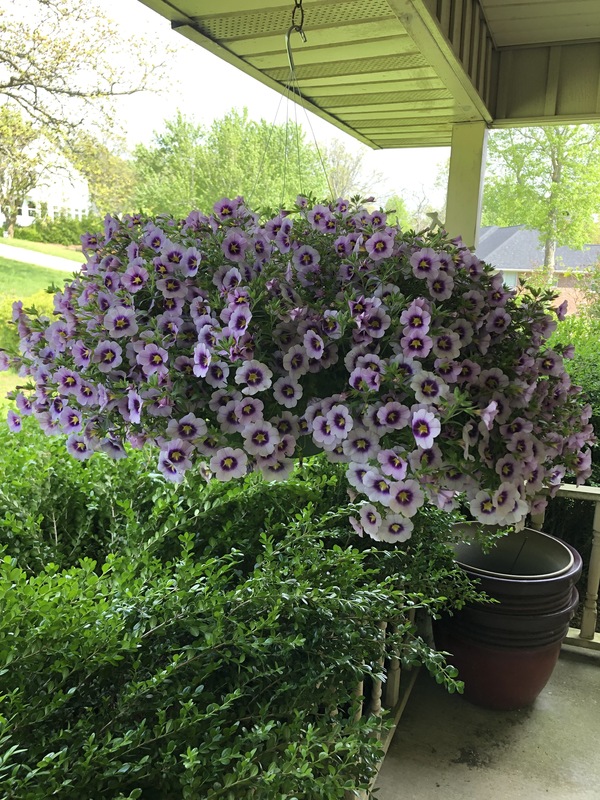 2022-05-08
2022-05-08Depression and Nature
The Covid-19 pandemic has been a low point in my life. The incredible isolation felt by so many has certainly not been lost on me. Indeed, I like so many had to place my life and plans on pause. From a lost Study Abroad trip to Ireland to putting off graduate school, covid-19 has fundamentally reshaped my life in a very negative way. Like so many people, I became deeply depressed and anxious about this new world when the old world had begun to look up for me, personally. One of the ways I learned to cope was nature. Living in Arkansas, or the "Natural State" I am surrounded by immense beauty. Fresh air, rolling hills, an abundance of green and vibrantly colored flowers allowed me to find and reflect on the natural world around me. In a way, nature has a way of providing consistency and stability in an every changing world. Spring is a time of tremendous rebirth, and I have included a picture of some flowers that have just bloomed. Indeed, this representation of rebirth demonstrates an optimism that the world will move beyond Covid-19 in a hopefully positive direction. -
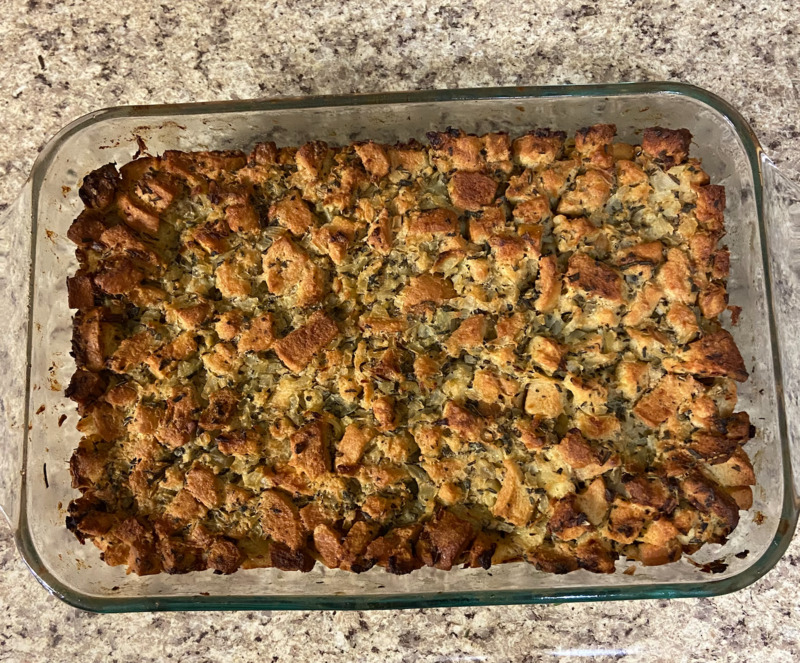 2020-11-26
2020-11-26Thanksgiving 2020
This was the homemade stuffing I made for Thanksgiving of 2020. Due to social distancing my family had in order to protect people, my extended family ate at two separate locations. For me, that meant going to my parent's place next door and dining with my aunt and uncle. My grandparents had their own celebration with other family members. One interesting twist to this was that we all ended up eating the same food between both houses because it was split up. This is why I ended up making a lot more stuffing than I normally would for Thanksgiving. In addition to this, I brought over some homemade cranberry sauce and homemade jam. I had learned to make canned jam during 2020, and I had some leftover to give. Everyone enjoyed the food I made and my aunt said it was some of the best stuffing she ever tasted, and she isn't really a big fan of stuffing. Sadly, the stuffing was not enough to ease tensions on the politics happening at the time. Other parts of the day included my family getting into a political discussion on the 2020 election. I had different views on it than my family did, so I left once that started. Later on in the evening, me and my husband went over to my in-laws. My sister-in-law was sick with COVID, so my father-in-law gave her food from the evening for her to take home. I was bummed about that, but people did not want to take their chances of getting others sick, which I understood. My father-in-law invited someone that year from Egypt for the occasion. It also turned into a political discussion there. I felt more comfortable voicing my opinions there than I did with my immediate family, but it was still draining. It made an otherwise okay evening into something that I don't want to think about. 2020 was a hard year for many people, and the election being so close to Thanksgiving made it very awkward. It has toned down since then, but I think people being locked down and exposed to constant social media and news coverage made it harder for people to actually discuss things. I think it's a good thing to be informed, but I do not believe the information overload many dealt with during 2020 was healthy. It even took a toll on me, as it made my mental health worse. Between the lockdowns, protests, and election, it was hard for me to take all at once. My only real solace was school and my husband, as both forced me to think of things not happening at the very moment. As a history major, I find it easier to think of events in the past than I do the present at times. It's why I really like the medieval period in Europe because it is far enough removed from the current era, so I am less likely to get heated about some of the topics brought up. With current events, I need to take a break at times. It was very obvious that the Thanksgiving from 2020 was not something that really made my mental health better. I enjoyed the food and the company, but I had a hard time wanting to discuss politics with people that I interact with regularly. It's one thing to discuss with strangers I might never see again, but completely another to talk about it with people that you need to interact with daily. Now that things are back to normal, for the most part, the tensions are not as high. I find myself being able to discuss politics again with some family members without it going badly. Overall, I would say that Thanksgiving 2020 was a good social experiment on how much overexposure to media and lockdowns can be detrimental to personal relationships. Seeing things behind a screen too often and being away from others takes a toll on humanity. This is why I was so glad when things started opening up again because people need to be out more and with others. As much as technology has helped us communicate, it still can't make up for the human interaction everyone needs. My own mental health has been much better since the ending of the restrictions and I don't want to go back to them again. -
2020-07-08
Motherless Immigrante Through Covid-19
Before the covid-19 pandemic, I immigrated with my father to the U.S. after my mom's death. It was a fresh beginning, I was living like in a dream, exploring, and being mesmerized by how beautiful and advanced LA is. However, one day everything changed and a lockdown that was supposed to last for 2 weeks, ended up lasting more than a year. At first, it was fun. I was looking at the positive side, doing times I haven't done in a while, watching movies and shows with my dad was incredible fun. However, with time my dad started to worry because he lost his job and did not receive any type of help. He eventually find a job for the summer, but I had too much time by myself that everything I could do was miss my mom. There were days that I didn't see my dad for the entire day because he needed two jobs to be able to pay our expenses and his dad's expenses outside the country. I started to get depressed. School started again but my cheerful character and interest in school never came back. Now, I feel like I am in airplane mode all the time. -
2022-04-29
Depression during a Pandemic
The COVID-19 pandemic has been one the hardest things for me to deal with. I suffer from depression and often combat this by spending time with friends and family. Before the pandemic I would often spend my weekends with friends and visit my family after work on half of the weekdays. Throughout the pandemic, until recently it has been rather unacceptable to spend time in close contact with others. In the being of the pandemic during the first shutdowns and mandates I struggled deeply with having to stay home all the time. I became quite depressed and would often just sleep through my days off. I tried to do virtual hangouts with my friends and family, but it just wasn’t the same. I ended up planning socially distanced hangouts with my friends, often picnics/lunch in the park 6 feet apart. This really helped me because I was able to socialize with them in person. As the pandemic progressed, and I wasn’t able to see friends nearly as often as before I became more comfortable with being alone. I started to find the things I enjoyed doing on my own. I took time to really work on some of the issues I had been avoiding. I used the time I was forced to be alone in a productive way. Although the pandemic challenged my way of living, I still found a way to grow. Now that we are starting to get a better handle on the virus, life is slowly starting to return to what it was before. With the release of vaccines I have been able to start seeing my friends and family again. With the lower rate of cases a lot of the business I used to visit are reopening. As we start to return to “normal” I’ve found my new normal and I quite enjoy my alone time, just as much as the time I spend with others. -
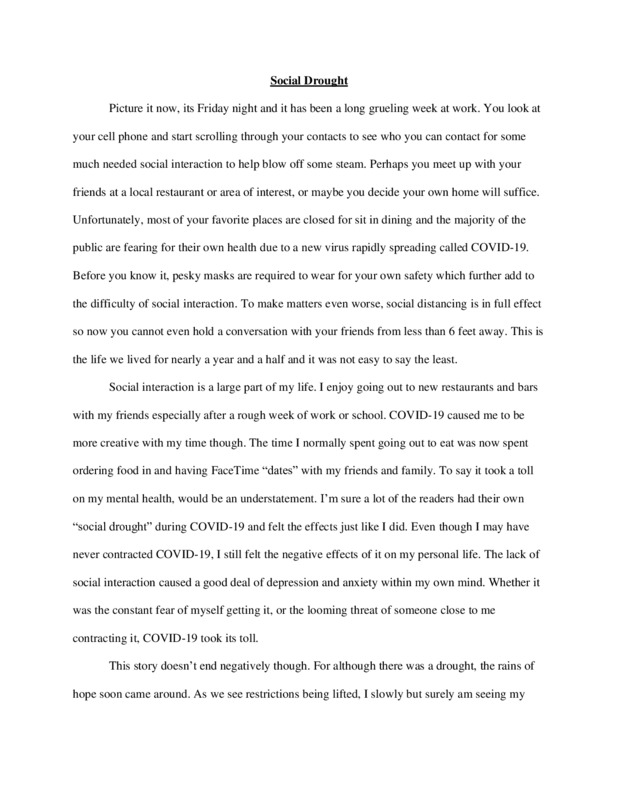 2022-04-29
2022-04-29Social Drought
Social Drought is a text story about how the pandemic erased all hopes of maintaining an active social life and how I had to find ways to fulfill my need for social interaction. -
2022-04-29
Dementia and Covid
Over the last two years, being away from people, and having to social distance, I have still taken care of my grandfather. He has Dementia. Now that things are starting to get a little better, and a lot of people have been vaccinated, I have been able to have him come stay the night at my house every Friday. The first couple of times he was confused, but now he seems to instinctively know the routine of it all. He likes getting to spend time with my stepdad and my girlfriend, and walk outside to see the horses. Covid has taken a lot, besides the countless lives. It rapidly increased my grandpa’s progression in memory loss. Most days he can’t quite remember my name or my mom's name. But at least he is happy, he laughs and smiles, and knows that he loves and trusts us. Him not being able to have as much social interaction as he used to has drastically changed his cognitive abilities. Today is a Friday. He was pretty quiet on the drive from his house to mine. I got him an ice cream cone. No matter where he is cognitively that man will always, always want an ice cream cone. Vanilla to be specific. We used to get ice cream cones from McDonald's when I was little when he would pick me up to spend the night at his house. I wonder how many ice cream cones we have left. I hate that his memory has been cut short and stripped from him. He had been slowly declining for the last few years before Covid, but once we hit the lockdowns, it was all over. He was good at hiding it for the first 6 months or so, but in the last year and a half it has been very clear. I miss who he was, I know we all do. -
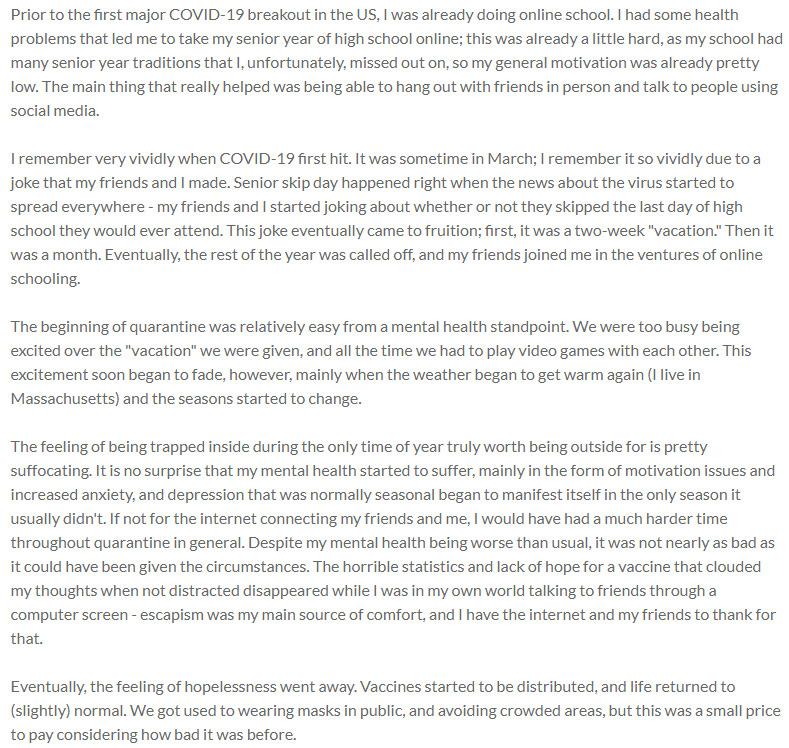 2020
2020How the Internet Saved My Mental Health During the COVID-19 Pandemic
Prior to the first major COVID-19 breakout in the US, I was already doing online school. I had some health problems that led me to take my senior year of high school online; this was already a little hard, as my school had many senior year traditions that I, unfortunately, missed out on, so my general motivation was already pretty low. The main thing that really helped was being able to hang out with friends in person and talk to people using social media. I remember very vividly when COVID-19 first hit. It was sometime in March; I remember it so vividly due to a joke that my friends and I made. Senior skip day happened right when the news about the virus started to spread everywhere - my friends and I started joking about whether or not they skipped the last day of high school they would ever attend. This joke eventually came to fruition; first, it was a two-week "vacation." Then it was a month. Eventually, the rest of the year was called off, and my friends joined me in the ventures of online schooling. The beginning of quarantine was relatively easy from a mental health standpoint. We were too busy being excited over the "vacation" we were given, and all the time we had to play video games with each other. This excitement soon began to fade, however, mainly when the weather began to get warm again (I live in Massachusetts) and the seasons started to change. The feeling of being trapped inside during the only time of year truly worth being outside for is pretty suffocating. It is no surprise that my mental health started to suffer, mainly in the form of motivation issues and increased anxiety, and depression that was normally seasonal began to manifest itself in the only season it usually didn't. If not for the internet connecting my friends and me, I would have had a much harder time throughout quarantine in general. Despite my mental health being worse than usual, it was not nearly as bad as it could have been given the circumstances. The horrible statistics and lack of hope for a vaccine that clouded my thoughts when not distracted disappeared while I was in my own world talking to friends through a computer screen - escapism was my main source of comfort, and I have the internet and my friends to thank for that. Eventually, the feeling of hopelessness went away. Vaccines started to be distributed, and life returned to (slightly) normal. We got used to wearing masks in public, and avoiding crowded areas, but this was a small price to pay considering how bad it was before. -
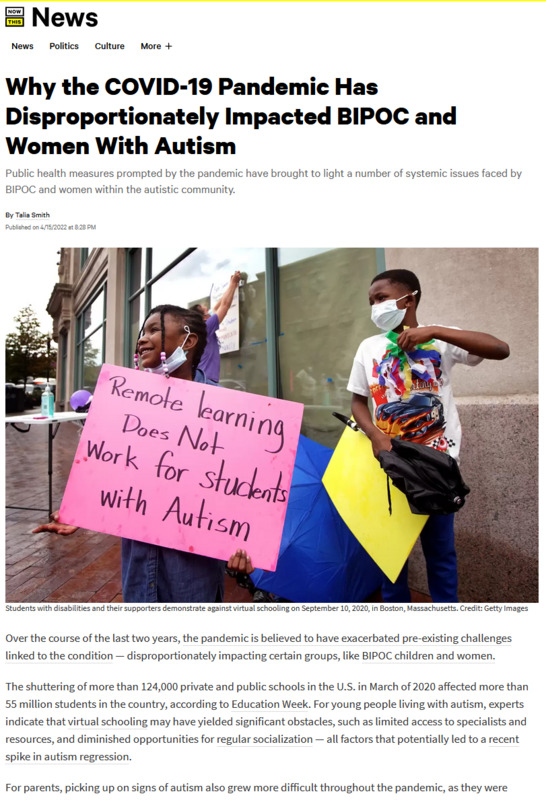 2022-04-15
2022-04-15Why the COVID-19 Pandemic Has Disproportionately Impacted BIPOC and Women With Autism
This is a news story from Now This News by Talia Smith. The author says that over the course of the pandemic, BIPOC and autistic women have been disproportionately affected. BIPOC parents who were not able to work remotely struggled to support their autistic children. One study led by the NIH analyzing the impact of the pandemic on BIPOC and low-income populations shows that families with a child living with autism witnessed an increase in sleep issues and behavioral problems, in addition to increased conflict between children and adults and the use of more severe disciplinary methods. In a study published in “Molecular Autism,” researchers revealed that for adults with autism, the pandemic brought relief from certain stressors like “sensory overload” and ultimately led to an “increase in solidarity.” -
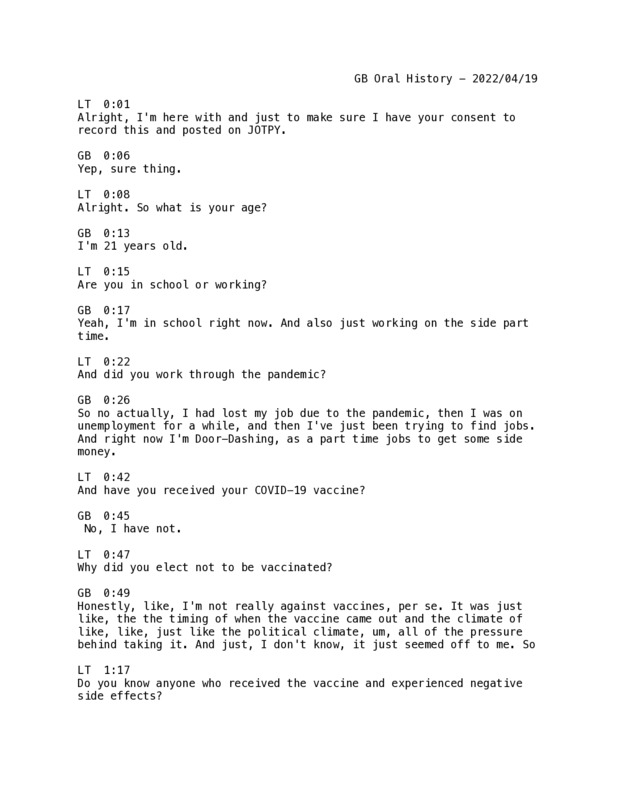 2022-04-19
2022-04-19GB Oral History, 2022/04/19
The interviewee discusses vaccine hesitancy and life during the pandemic without having received the vaccine. -
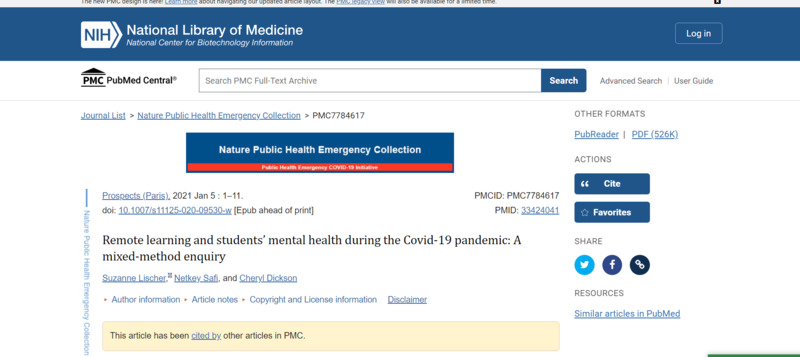 2021-01-05
2021-01-05The Covid Pandemic as a Senior in Highschool
The website that I am linking describes what happened to students all over the world in March of 2020 when all students in schools and universities had to go on lockdown and switch abruptly to complete online learning. This is an important covid-19 related topic to me because I was a senior in high school during that time, and I really struggled with my mental health, academic achievements, responsibilities, body image, and just overall my whole life. This article isn't as personal as it could get, but it gives a good historical and general idea of what student experience during the pandemic was like.
